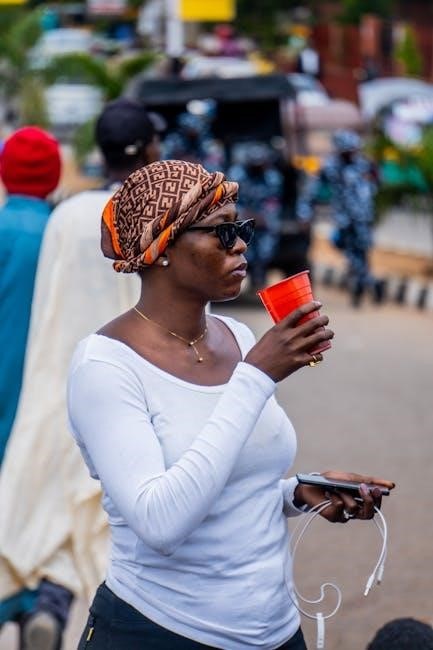
Military coups have profoundly shaped Nigeria’s political landscape, beginning with the 1966 overthrow of the civilian government, setting off a chain of events that reshaped governance and stability in the nation.
1.1 Historical Context of Military Coups in Nigeria
Nigeria’s history of military coups began shortly after independence in 1960, with the first coup occurring in 1966. This period marked the military’s entry into politics, driven by political instability and ethnic tensions. The coups reflected broader regional trends in Africa during the 1960s. Key figures like Major Nzeogwu and General Aguiyi-Ironsi emerged, shaping Nigeria’s trajectory under military rule, which persisted until the transition to civilian governance in 1999.

The First Military Coup of 1966
The first military coup in Nigeria occurred on January 15, 1966, led by young army officers, marking the beginning of military influence in Nigerian politics.
2.1 The January 15, 1966 Coup and Its Aftermath
Led by Major Chukwuma Kaduna Nzeogwu, the January 15, 1966 coup overthrew Nigeria’s civilian government, initially aimed at addressing corruption and inefficiency. The coup sparked widespread chaos, leading to the assassination of key political leaders. General Aguiyi-Ironsi eventually took control, but his tenure was short-lived, as a counter-coup later that year plunged Nigeria into further instability and ultimately contributed to the Nigerian Civil War.

Causes of Military Coups in Nigeria
Political instability, ethnic tensions, economic disparities, and corruption have historically driven military coups in Nigeria, creating an environment of discontent among both civilians and military leaders.
3.1 Political Instability and Ethnic Tensions
Political instability and ethnic tensions were root causes of military coups in Nigeria; The 1966 coup, led by Major Nzeogwu, exploited regional and ethnic divisions, sparking a chain of interventions. These tensions often led to power struggles, with the military stepping in to address perceived governance failures, further destabilizing the political system and creating cycles of unrest and authoritarian rule.
3.2 Economic Factors and Corruption
Economic disparities and rampant corruption fueled military coups in Nigeria. Poor resource management and graft under civilian regimes created widespread discontent. The military exploited these grievances, often citing economic mismanagement as justification for interventions. Corruption perpetuated instability, undermining public trust and creating an environment conducive to repeated coups, further entrenching military involvement in politics and hindering sustainable development.

Consequences of Military Coups
Military coups in Nigeria led to political instability, economic stagnation, and social unrest, undermining democracy and development while fostering prolonged periods of authoritarian rule and ethnic tensions.
4.1 Political Instability and Power Struggles
Military coups in Nigeria fostered chronic political instability, with frequent government overthrows and power struggles. This weakened democratic institutions, entrenched authoritarianism, and exacerbated ethnic tensions, leading to prolonged societal divisions and governance challenges.
4.2 Economic Stagnation and Underdevelopment
Military coups in Nigeria perpetuated economic stagnation, as frequent regime changes disrupted long-term planning and policy continuity. Corruption and mismanagement of resources by military rulers led to underinvestment in infrastructure, education, and healthcare, exacerbating poverty and inequality. This cycle of instability hindered economic growth, leaving Nigeria struggling to achieve sustainable development despite its vast natural resources.
4.3 Social Unrest and Ethnic Violence
Military coups in Nigeria often triggered social unrest and ethnic violence, as power struggles and resource competition exacerbated existing tensions. The 1966 coups and subsequent civil war highlighted deep ethnic divisions, leading to widespread conflict and mistrust. These events left lasting scars, contributing to ongoing communal clashes and challenging national unity and social cohesion in post-colonial Nigeria.
Evolution of Military Rule in Nigeria
Military rule in Nigeria spanned over three decades, marked by multiple coups, power struggles, and transitions, ultimately leading to democratic governance in 1999 after prolonged instability.
5.1 From 1966 to 1975: Initial Years of Military Governance
The period from 1966 to 1975 marked the beginning of military governance in Nigeria, starting with the coup led by Major Chukwuma Kaduna Nzeogwu, which overthrew the civilian government. General Aguiyi-Ironsi briefly led the country but was assassinated in a counter-coup. General Yakubu Gowon then took power, navigating the nation through a devastating civil war and initial attempts at stabilization, setting the stage for prolonged military rule.
5.2 From 1975 to 1993: Prolonged Military Regimes
The period from 1975 to 1993 saw prolonged military rule in Nigeria, marked by frequent coups and regime changes. General Murtala Mohammed seized power in 1975, followed by Olusegun Obasanjo, who handed over to civilians in 1979. However, General Muhammadu Buhari led a coup in 1983, and General Ibrahim Babangida ruled until 1993. This era was characterized by political instability, economic stagnation, and human rights abuses, leaving a lasting impact on Nigeria’s governance and development.
5.3 Transition to Civilian Rule in 1999
The transition to civilian rule in 1999 marked a significant shift in Nigeria’s political history. After years of military governance, General Abdulsalami Abubakar oversaw a peaceful handover to democratically elected President Olusegun Obasanjo on May 29, 1999. This transition ended 16 years of military rule and ushered in the Fourth Republic, restoring constitutional governance and offering hope for political stability and democratic consolidation in Nigeria.
Key Figures in Nigerian Military Coups
Major Chukwuma Nzeogwu, General Aguiyi-Ironsi, and other influential leaders played pivotal roles in shaping Nigeria’s military coup history, their actions defining the nation’s political trajectory.
6.1 Major Chukwuma Kaduna Nzeogwu and the 1966 Coup
Major Chukwuma Kaduna Nzeogwu, a reform-minded radical, led the January 15, 1966 coup, overthrowing Nigeria’s civilian government. This pivotal event marked the military’s entry into politics, driven by grievances and inspired by Africa’s wave of coups. Nzeogwu’s actions, though not part of the subsequent regime, set off a chain reaction shaping Nigeria’s political trajectory for decades, leaving a lasting legacy in the nation’s history.
6;2 General Aguiyi-Ironsi and His Leadership
General Aguiyi-Ironsi emerged as Nigeria’s first military head of state after the 1966 coup. His leadership aimed at stabilizing the nation, yet his tenure was brief and tumultuous. Ironsi’s assassination in a counter-coup later that year underscored the volatile political climate, setting the stage for prolonged military rule and further instability in Nigeria’s governance structure during the late 1960s and beyond.
6.3 Other Influential Military Leaders
Beyond Aguiyi-Ironsi, figures like General Yakubu Gowon, Murtala Mohammed, and Ibrahim Babangida played pivotal roles in Nigeria’s military history. Gowon led during the civil war, while Mohammed’s regime introduced reforms. Babangida’s leadership was marked by political restructuring and economic policies. These leaders, through their actions, significantly influenced Nigeria’s political and social trajectory, shaping its military and civilian governance dynamics over decades.
Impact of Military Coups on Nigerian Society
Military coups deeply disrupted Nigerian society, fostering political instability, ethnic tensions, and social unrest, which undermined public trust in institutions and hindered national unity and development.
7.1 Effects on Governance and Democracy
Military coups severely weakened Nigeria’s governance structures, undermining democratic institutions and fostering authoritarian rule. The frequent overthrow of elected governments created a cycle of political instability, eroding public trust and hindering the consolidation of democracy. This prolonged military involvement in politics stifled the growth of democratic culture, leaving long-lasting scars on the nation’s governance framework and societal cohesion.
7.2 Influence on Economic Development
Military coups disrupted Nigeria’s economic development by fostering corruption, mismanagement, and instability. The frequent regime changes led to inconsistent policies, discouraging foreign investment and hindering long-term economic planning. The nation’s resources were often diverted to serve the interests of ruling elites rather than the populace, perpetuating underdevelopment and exacerbating socioeconomic challenges.
7.3 Role in Shaping National Identity
Military coups deeply influenced Nigeria’s national identity by exacerbating ethnic divisions and fostering mistrust among its diverse groups. The 1966 coups and subsequent counter-coups highlighted regional and ethnic tensions, leading to the Biafra secession attempt. These events reshaped Nigeria’s identity, creating a legacy of political instability and social fragmentation that continues to affect national unity and collective identity, undermining efforts to build a cohesive nation-state.

Recent Developments and Current Implications
Recent coups in neighboring Niger and Gabon have sparked concerns about Nigeria’s stability, though the military has reaffirmed loyalty to civilian rule, emphasizing democracy’s strength and resilience.
8.1 The Role of the Military in Modern Nigerian Politics
The Nigerian military, while maintaining a formal commitment to civilian rule, continues to influence political dynamics through strategic security operations and occasional warnings against coup rhetoric. Their role is pivotal in stabilizing a fragile democracy, though historical precedents of intervention linger, shaping public and governmental perceptions of their potential resurgence in governance.
8.2 Lessons Learned and Future Prospects
Nigeria’s history of military coups underscores the importance of strengthening democratic institutions and addressing systemic corruption. The transition to civilian rule in 1999 marked a significant shift, but vigilance is crucial to prevent future interventions. Lessons learned emphasize the need for political stability, economic equity, and ethnic unity to foster enduring democracy and prosperity in Nigeria.
Nigeria’s history of military coups highlights the nation’s struggle for political stability and democratic governance, emphasizing the need for systemic reforms to prevent future interventions.
9.1 Summary of Key Points
Nigeria’s history of military coups, starting from 1966, reflects deep political instability, ethnic tensions, and economic mismanagement. These interventions disrupted democratic governance, leading to prolonged military rule until 1999. The coups highlighted systemic weaknesses, necessitating reforms to foster stability and civilian leadership. Lessons from this era remain crucial for Nigeria’s democratic evolution and future prospects.